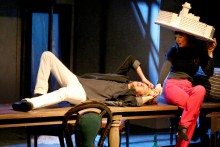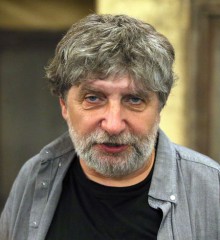At the Chamber stage of Ivan Franko National Theater, Bretislav Rychlik directed one of the last pieces written by his compatriot Vaclav Havel (1936-2011) – a renowned playwright, dissident, human rights activist, statesman, the last president of Czechoslovakia and the first president of the Czech Republic. Havel’s Year continues in Ukraine as October 5 will mark the 80th anniversary of this outstanding person.
Redevelopment is a tragicomedy that mocks bureaucratic arrogance and destruction of the natural human environment. The act takes place in an old castle, inhabited by architects. As they are given the task to modernize the old areas of the city, not only the incompetence of the authorities holds them up, but also their own ambitions, unfulfilled dreams, and fears, rooted in the subconscious. At the same time, the play goes beyond the “production drama” genre, because its main conflict is still driven by love...
Our conversation with renowned Czech director Bretislav RYCHLIK started with a reminiscence of his first meeting with Vaclav Havel.
“WE, YOUNG ARTISTS, WERE FASCINATED WITH HAVEL”
“Before I met Havel I had considered him a living legend,” says Rychlik. “During the Prague Spring he called for development of a democratic civil society. After the brutal suppression of the reform in 1968 by means of military invasion on behalf of the Warsaw Pact countries, Havel was punished. His publications were banned, and he became one of the most famous dissidents, critics of the regime. Havel defended the rights of political prisoners and became a co-founder and one of the first speakers of the Charter 77, a civil initiative on human rights. His fame was worldwide, and then he became imprisoned for nearly five years for his political activity... After the Velvet Revolution in November 1989, Havel founded Civic Forum, an anti-communist movement, and soon was elected a president of Czechoslovakia.
“In the early 1980s, when we had our first meeting, Vaclav Havel had been serving his longest term in prison, as he was convicted in 1979 on charges of ‘infringement upon the interests of the republic.’ However, in February 1983 he was released under house arrest because of pneumonia; he had some serious health problems and the authorities were scared that he would die in prison. So in early 1983, Havel was released, and one of my friends brought him to the theater where I used to work as an actor at the time. It was a small avant-garde theater from Brno temporarily on tour in Prague. After the performance Havel stayed with us, and we talked all night! We, young artists, were fascinated with him. And in turn, we were interesting to Havel – he was very glad that in the years he spent in prison a new theatrical culture had emerged in the country. Then he started visiting our theater regularly and developed a very friendly relationship with us. After Havel became president, our playwright, with whom I was friends, even became his adviser for two years...”
At that time, were Havel’s plays on stage at home?
“None of his works were published or put on stage! One could get acquainted with Havel’s works only through grassroots underground publishing. In October 1988, two theaters in Brno issued a unique magazine named RozRazil (Issue No. 1/88, ‘On Democracy’). This magazine published Havel’s play Tomorrow, and we staged it. However, only five or six people in the whole country knew about the real author, as the posters featured Peter Oslzly, playwright of the ‘Goose on a String’ theater, as the author. Vaclav Havel had then been the regime’s enemy number one. We played this performance for large audiences – thousands of people have seen it before our secret police shut it down after the twenty-first time – the authorities suspected that Havel’s text could be in it. We have been accused of a number of violations of the Constitution and laws of the state. One of the charges was related to us allegedly trampling the state flag on stage. But our lawyers managed to dismiss the charges in court. So, we defended the play and continued to perform it. Actually, then, in 1987, Vaclav Havel wrote his Redevelopment, imbued with the atmosphere of the pre-revolutionary era.”
It is known that power often corrupts people. It is interesting, had his spell as the president changed Vaclav Havel?
“People of his type don’t change radically through the temptations of power. It was, rather, the environment that has changed. Havel was a very responsible person, and the whole situation with the presidency had undermined his health. So, he was very happy at the thought that soon, at the end of his term, everything related to his political life would come to an end. Then, he would be able to write again, to work as a playwright in a small theater. But that dreams were futile, because he became very famous in the world thanks to his international political activity. After his term, Havel managed to write only one play, Leaving, which he also managed to make a movie of, fulfilling another dream of his. As for me, I was present at the celebration of his 75th anniversary, which took place shortly before his death. Six months before that Vaclav invited his friends (writers Ludvik Vaculik, Ivan Klima, and me) to say goodbye in anticipation of the imminent death – he was at that time very ill, he survived cancer, and years in jail had left not the best impact on his health.”
“NORMAL PEOPLE ARE HAPPY THAT THE CZECH REPUBLIC ENTERED THE EUROPEAN UNION AND IS PROTECTED BY NATO”
Why did you decide to put Redevelopment on stage?
“I like this play, and the translator Yurii Vynnychuk chose it too. Though Redevelopment is written in a certain historical moment associated with the change of political system, it is a timeless piece. It explores the issues of how authorities manipulate people’s consciousness and how it breaks talented people. It explores revolution that took place in a way that was not anticipated, the ideals of the revolution that failed to materialize, the euphoria and despair, the frustration that come to replace the revolution. Redevelopment has the most of Chekhov’s heritage of all Havel’s dramatic works – it is also a play about love and betrayal, about romance, dreams and aspirations of young people – and the weariness, the bitter experience of the elderly.”
And how is the political legacy of Havel perceived in the Czech Republic these days?
“Unfortunately, many are now downplaying the legacy of Vaclav Havel. This can be seen even among his followers, such as Vaclav Klaus and Milos Zeman. They are trying to distance themselves from the ‘Havel’s era’ as if they were themselves not involved in it. I struggle to find an explanation for it, the only reason I can see is painful narcissism of these people. It is their psychological complexes, their envy to Havel’s popularity which they did not enjoy. For example, our incumbent President Milos Zeman is not respected in the West by anybody, only the Chinese and Putin from Russia communicate with him.”
How do the Czechs assess Putin’s aggression against Ukraine?
“Most normal people who are not affected by Russian propaganda are able to assess the situation adequately. Of course, there are those who fear war and who believe that Putin would protect them from it. But normal people are happy that the Czech Republic entered the European Union and is protected by NATO. Our government has condemned the occupation of Crimea by supporting sanctions against Russia. Our statesmen often visit Ukraine, some of them are even going to premiere performance of Redevelopment.”
“YOUR ACTORS HAVE A HUGE CREATIVE, EMOTIONAL POTENTIAL”
How do you like working with Ukrainian actors on the play?
“Both I and your actors feel the difference of the two cultures – Czech and Ukrainian. Your actors have a huge creative, emotional potential, they are very talented. Of course, they realize the difference in the approaches to work. For example, it is unusual for them that a performance can contain several theatrical poetics. Some scenes are better in Chekhov’s style, others – as in Shakespeare, and there are those where one should not play anything, just be themselves... Your actors are inspired, they quickly learn to cope with the creative tasks that I put before them. Our actors have more autonomy in everything, even in the choice of costumes, props, not to mention the fact that they are more capable in suggesting creative ideas. I understand that the contrast is there not only because of the difference in cultures, but also because it is big theater, the National Theater. I used to work in small theaters, where actors are more proactive. Also, I faced another feature of Ukrainian mentality, which makes every work take more time. Well, of course, there is also a well-known Soviet bureaucratic habit of requiring documents all the time. For the things that in our country would be available upon simply asking, we are required to write a request, to receive a written permission. Throughout my life I have not written as many papers as here. I even remembered the story of the Russian writer Lev Lunts, written about it in Kafka’s spirit. His character, a bureaucrat, dreamed to become the very paper on which his boss would write something on. Indeed, one morning he turned into a piece of paper, which his boss used in the toilet. So, a simple conclusion to suggest: excess paper hampers creative work! However, we do overcome all our differences. And I hope Ukrainian viewers will enjoy our Redevelopment.”








